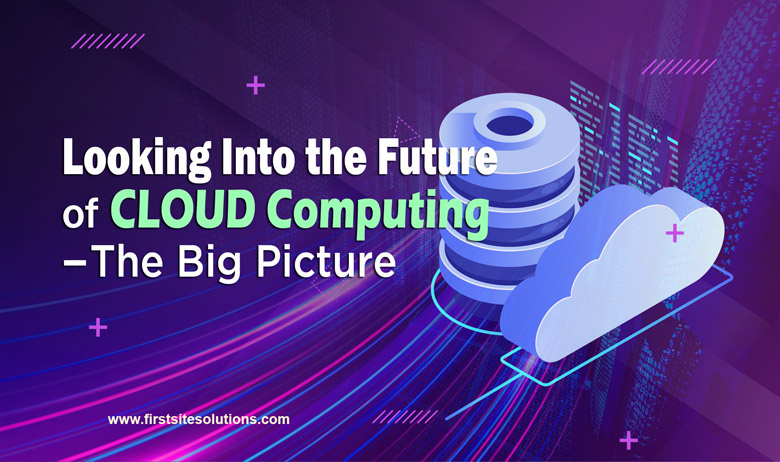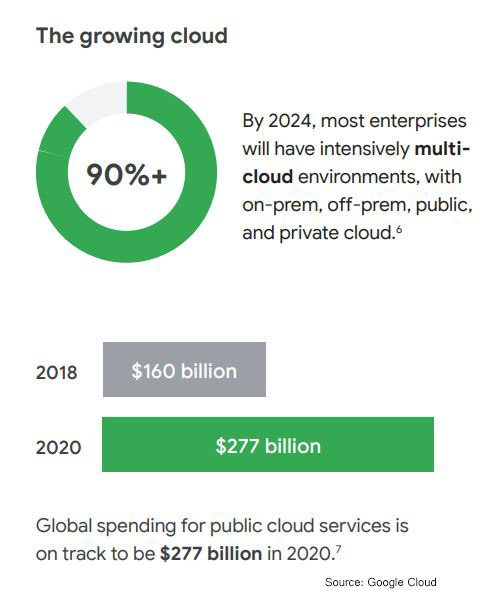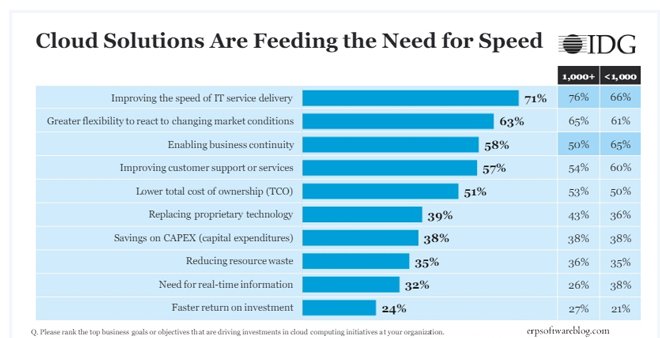
Long gone are the days when everything used to be stored physically on paper. In this digital era, data is now available on hard drives of computers and servers. But as organizations evolve, they need smart, innovative solutions that will help them easily store and access vast amounts of data whenever required.
This has given rise to cloud adoption. It’s helping businesses achieve their goals better and enhance overall performance. With the agility, flexibility, security, mobility, and scalability that the cloud offers, companies can remain competitive in the rapidly changing commercial climate.
According to RightScale, 81% of organizations with 1,000+ employees have already invested in this technology. And this statistic is expected to grow. The critical question is whether you are included in this statistic.

If you aren't, you're not the only one. Companies are just beginning to understand the benefits of cloud computing. However, it is the future. If you want your business to thrive in the digital landscape, you need to move towards cloud computing sooner rather than later.
But before we dive deeper into this topic, let’s begin with the basics.

What does cloud computing mean?
Microsoft Azure has a straightforward definition:
“Cloud computing is the delivery of computing services—including servers, storage, databases, networking, software, analytics, and intelligence—over the Internet (‘the cloud’).”
What are the benefits of cloud computing?
Like most IT developments, cloud computing comes with a package of benefits. It allows businesses to redirect resources towards innovation and development, empowering them for the tech-immersed future. So, it’s understandable that companies of all sizes have high hopes for cloud solutions. Some expect the following results:

In order to understand what cloud computing can offer your business, you need to comprehend its advantages and how it can improve organizational operations. Here are a few reasons why businesses find cloud computing so attractive and how it can pave the way for technological advancements in the future.
1. Reduces overall costs
The cost of hardware, software, and maintenance adds up quickly. With cloud computing, you don't need to invest in hardware and utilities or set up and run data centers to support your company. In fact, cloud computing services often have a pay-as-you-go model so that businesses do not have to pay for services they don’t need.
Additionally, it means you won't need to employ personnel to manage and maintain your data operations. More importantly, cloud systems rarely experience downtime. This eliminates the costs associated with disrupted operations and, subsequently, fixing the issue.
Generally speaking, OpsRamp states that nearly 50% of the respondents saw a reduction in IT service costs by 30-50% with the help of cloud computing services.
2. Boosts speed and agility
The marketing landscape continues to evolve at an accelerated pace. Companies must adapt quickly or run the risk of falling behind. Cloud computing allows quick access to resources, thereby letting businesses respond to changes in real-time.
3. Better accessibility
One of the greatest advantages of the cloud is that it allows organizations and their employees to work remotely from anywhere across the globe. Data can be readily accessed from any location, at any time, from multiple devices.
More importantly, cloud computing enables data to be shared in real-time. This fosters better collaboration, productivity, and engagement among team members.
4. More storage space
Today, it’s all about data. Having access to data and being able to analyze it allows businesses to make more accurate decisions and plan long-term strategies. But it’s getting increasingly challenging to store high volumes of data securely. Cloud providers provide more storage at cost-effective prices.
5. Enhanced security
Almost all organizations today have concerns about data security. Digitization has increased data vulnerability. Therefore, businesses need to ensure practices that will help to protect and secure data. At the moment, the cloud is a great solution.
With the help of data encryption, cloud vendors can avert cyber-attacks through custom security settings. Moreover, the cloud offers an easy way to backup data in a secure environment, enabling effortless data recovery and business continuity. According to RapidScale, 94% of surveyed companies were able to improve security after moving to cloud computing.
6. Greater flexibility
Cloud computing is revolutionizing how employees work. Now, on-the-go and remote work is offering greater flexibility. But from a growth perspective, the cloud opens limitless opportunities by eliminating many barriers to growth.
Organizations can now extend their IT resources and scale the business through the cloud. Moreover, with an assortment of tech services, they can integrate cloud solutions quickly and cost-effectively to meet specific demands. In fact, hybrid cloud systems are being developed to increase cloud service flexibility and provide better options for business needs through customization.
The scope of cloud computing
Cloud computing is becoming mainstream as it makes its way into various enterprises. To get the big picture of how cloud computing will be a major part of our future, let’s now look at where and how it can be applied.
Marketing
Digital marketing deals with a lot of data from various sources to devise effective marketing campaigns. Whether your goal is to improve consumer engagement or boost sales and revenue, digital marketers must collect and organize everything before extensive data sets can be analyzed.
On a cloud-based marketing platform, all the data is available in one centralized location. Integrating marketing tools (analytics, social management measurement tools, email marketing tools, etc.) is a lot easier and managing a multi-channel campaign (social media, mobile, email, and web) is much simpler.
Education
Cloud computing offers a modern approach to learning. It eliminates the need for libraries or textbooks and focuses on alternative modes of remote education. Digitally-enabled classrooms facilitate e-learning allowing teachers to upload lectures and study aids while students can create presentations and submit assignments. Whether it’s attending classes or participating in globally distributed projects, students can access more learning opportunities.
Healthcare
Healthcare providers must store, maintain, share, and secure every patient’s personal health information. Cloud computing can make these tasks easier, but it can significantly decrease costs and improve a clinic's efficiency. With the help of cloud-based solutions, patients can receive timely, more-informed treatments.
Data analytics
Big Data allows businesses to use abundant amounts of data, offering opportunities for improvement and research. However, the supply of data never stops. With the aid of data analytics, businesses can now use continuous data to make better strategies, judgments, and decisions. However, challenges for storing, transporting, processing, and mining the data are present.
Cloud computing addresses these challenges and offers plausible solutions to businesses. By collaborating with technology, they can work faster and more efficiently.
Internet of Things (IoT)
Devices are connecting with one another through IoT. To encourage and support this technology, devices need quick access to vast amounts of real-time data. Cloud computing provides ample safe storage where devices can easily share information in the same space.
Cloud computing trends
To truly grasp the future of cloud computing, you need to consider the current trends surrounding it. Here a few that you need to keep in mind:
Edge computing and zero latency
Cloud computing refers to central storing, processing, and analyzing data on remote third-party servers or data centers. This often results in latency issues. However, data can be stored and processed near the data collection source to overcome this issue, offering almost zero latency. This is referred to as edge computing. It will possibly become the future of cloud computing as the need for speed increases, especially with the rise in IoT.
Internet of Everything (IoE)
With the widespread incorporation of IoT, it’s only natural that IoE will follow in its footsteps. And it’s only a matter of time that everything will be connected to the internet- people, data, and processes, not just physical devices. According to an analysis by Cisco, IoE will create $4.6 trillion in ‘Value at Stake’ for the public sector globally over the next decade to "connect the unconnected."
Serverless architecture
Serverless architecture is the future of cloud computing. It removes barriers that a traditional IT infrastructure has. Businesses will no longer need to purchase or rent servers. Instead, a third-party such as AWS will manage the infrastructure.
This means that serverless architecture makes operational management easier, lowers costs, system administration is not required, and reduces liability. More importantly, serverless computing simplifies the process of deploying code. Developers can create a faster release cycle by splitting software into chunks of code and upload onto the cloud.
Quantum computing
Quantum computing leverages the principles of quantum physics to perform complex algorithm calculations. Quantum computers can process massive datasets really quickly. This allows businesses to gain a competitive advantage by optimizing operations, making processes more efficient, and saving time. But a significant benefit lies in its ability to be used for electronic communication encryption and enhancing cybersecurity.
A cloud-based quantum computer provides the advantages of both technologies. Much like AI and ML, quantum computing is an emerging technology that has the potential to disrupt industries.
Cloud computing is here to stay
No doubt, cloud computing has transformed the way businesses traditionally work. In fact, it’s proving to be a game-changer that is impacting productivity, efficiency, revenue, and growth models.
But this is merely the tip of the iceberg. With the integration of other technologies, such as AI and IoT, alongside cloud computing, cloud services can offer greater benefits to businesses in every sector. It’s time that you take this digital transformation in stride and make headway towards a successful future.







